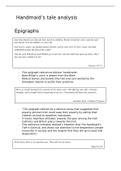Handmaid’s tale analysis
Epigraphs
And when Rachel saw that she bare Jacob no children, Rachel envied her sister; and she said
unto Jacob, Give me children, or else I die.
And Jacob’s anger was kindled against Rachel; and he said, Am I in God’s stead, who hath
withheld from thee the fruit of the womb?
And she said, Behold my maid Bilhah, go in unto her; and she shall bear upon my knees, that I
may also have children by her.
Genesis, 30:1-3
- This epigraph references biblical ‘handmaids’.
- Note Bilhah’s voice is absent from the Bible
- Biblical stories and beliefs (like this one) are twisted by the
Gileadean regime to justify their practices.
But is to myself, having been wearied out for many years with offering vain, idle, visionary
thoughts, and at length utterly despairing of success, I fortunately fell upon this proposal…
Jonothan Swift, A Modest Proposal
- This epigraph references a satirical essay that suggested that
poverty-stricken Irish could ease their poverty by selling their
children as food to wealthier individuals.
- It mocks heartless attitudes towards the poor among the Irish
Catholics and British policy towards the Irish.
- This reference indicates Atwood’s intention that The Handmaid’s
Tale is satirical, and draws our attention to the desperation people
encounter in society and the lengths that they will go to ease that
desperation.
In the desert there is no sign that says, Thou salt not eat stones.
Sufi proverb
,- In time of desperation, people will do anything they can to survive, even
‘eat[ing] stones’ in a desert.
, Offred
Offred is the protagonist of the Handmaid’s Tale. Stripped of her personal
identity and individualism, she is now forced to take up the role of a
handmaid, or surrogate for ‘Commanders’. Offred’s hope allows her to
survive in her harsh new reality. Initially, she fulfills her role as a
handmaid as the Gileadean regime intends her to do. However, when the
Commander invites her to visit him in his office, her relationship with him
shifts. She discovers he is not completely law-abiding and begins to build
a relationship with him outside their government-sanctioned roles. He
invites her to sneak into the Jezebel’s nightclub, a hedonistic place for
Commander’s to enjoy all the now-illegal pleasures available for the
regime. There, she reunites with Moira, an old friend.
Offred’s relationship with the Commander once again changes when
Serena Joy suggests Offred sleeps with Nick in order to fall pregnant. As
Offred’s relationship with Nick progresses, Offred grows disinterested in
the Commander. Offred’s story ends when a black van, potentially called
by Nick to save Offred, arrives at the Commander’s residence to pick up
Offred.
Summary of main points:
Start:
- Disempowered, losing her sense of self and identity.
- Somewhat defiant
- Hope drives Offred and allows her to survive.
- Somewhat empowered by her position.
- Trapped, influenced and fearful of regime.
- Empathetic.
- Offred’s relationship with the Commander is strange.
- Offred does find some power.
Change:
- Opportunistic and curious – Offred wants to figure out what the
Commander wants and how it could benefit her and therefore she
engages in an affair with the Commander
- Offred is still powerless to the Commander.
- Offred gains some power.
End:
- Empowered
- Powerless, vulnerable, fearful, betrayed, disappointed.
- Comfortable and complacent.
- Holds onto hope.




